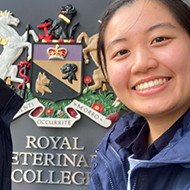
The International Canine Health Awards are known as the ‘Nobel Prizes of the Veterinary World.’
The Royal Veterinary College (RVC) is celebrating after winning three out of four categories in the 2021 International Canine Health Awards.
Senior lecturer Dr Dan O’Neill scooped the International Award for his novel work exploring canine health from a quantitative perspective, including his work co-leading the RVC’s VetCompass™ programme. Dr O'Neill will use the £40,000 prize money to encourage and inspire the next generation of canine epidemiologists.
Recent graduate Yan Hui Lee won the Undergraduate Student Inspiration Award for her study into aural haematoma. Yan aims to publish her study as a peer-reviewed publication, and the funding will enable the paper to be made freely available to dog owners everywhere.
Fellow RVC graduate Eleanor Wilson also won the Undergraduate Student Inspiration award for her research to develop a new method of sequencing to investigate the activity of T-cell receptors in dogs. Eleanor will use the prize winnings to further her studies into the role of T-cells in cancer, which could potentially pave the way to new therapies.
Dr O’Neill said: “I am so delighted that the VetCompass work at the RVC has been recognised with this fantastic and generous award. This will help hugely to further encourage and inspire the next generation of canine epidemiologists. My view is that everybody wins when we share ideas and data – this is the VetCompass™ ethos which I hope will continue to benefit the health and wellbeing of thousands of dogs across the UK and, potentially, the world.”
Yan Hui Lee commented: “It is an honour to be chosen for this award, and it reminds me that even as a student, I can contribute to the improvement of animal welfare. I believe that big dreams are achieved by taking small steps, and the main goal of improving breed health and animal welfare requires the collective effort from various bodies and individuals, such as veterinarians, breeders, and clients."
Eleanor Wilson added: “I’m so excited to have been selected for this award. This generous support from the Kennel Club and the International Canine Health Awards will allow me to return to Edinburgh and continue this work and potentially contribute to new therapeutic approaches."
The International Canine Health Awards are known as the ‘Nobel Prizes of the Veterinary World.’ The winners will receive their awards in a virtual ceremony on 30 June.
Image (C) RVC.



 RCVS Knowledge has called on vet practices to audit their post-operative neutering outcomes.
RCVS Knowledge has called on vet practices to audit their post-operative neutering outcomes.